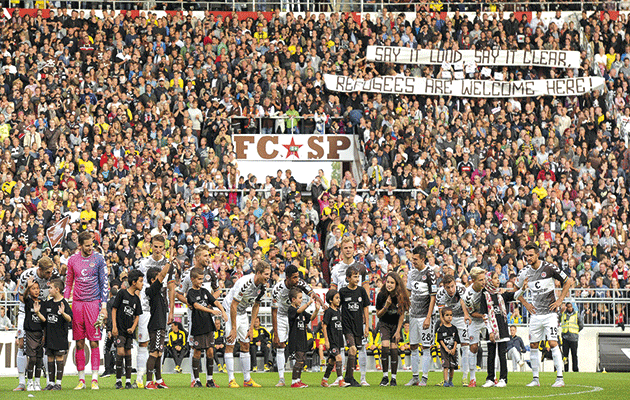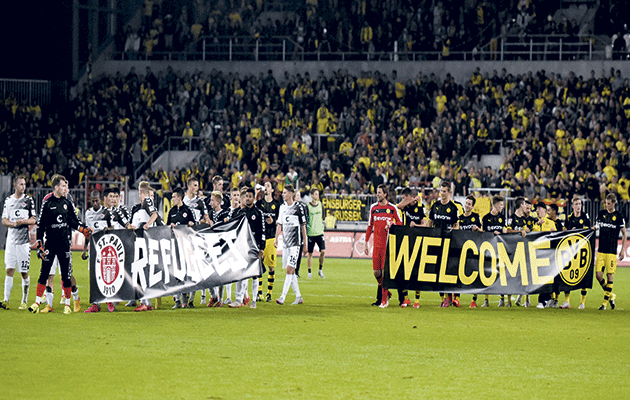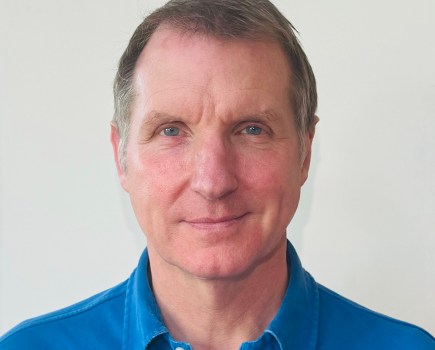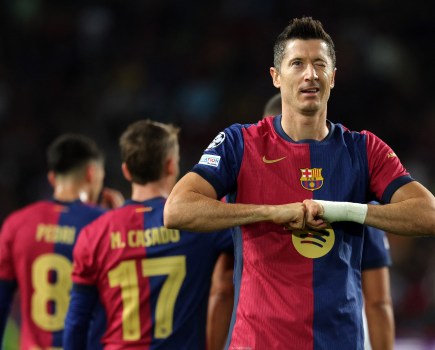The players were led out hand in hand by the children of refugees as the crowd in all four stands stood to applaud. When the teams from Borussia Dortmund and St Pauli reached the middle of the pitch, the messages were raised too.
Homemade signs, some made out of ripped up cardboard boxes, next to flags and more professionally-made posters. Some were in English, some in German and a few in Arabic. Next to them, larger banners were unfurled that sent a message not just to fellow fans, the players and the clubs, but to the outside world.
“No Border, No Nation,” read one. “Say It Loud, Say It Clear, Refugees Are Welcome Here!” read the biggest.
At present, Europe has been gripped by the worst refugee crisis since the end of the Second World War. Tens of thousands have arrived in Europe on a daily basis, the vast majority of which are fleeing the civil war in Syria, where over half the country has now been displaced.
As their numbers have grown, so has the political opposition and mistreatment at the hands of the authorities, especially in Hungary. But two moments have shifted the mood. The first was the discovery, in August, of a refrigerated truck, abandoned on a highway in Austria, crammed with the bodies of 71 refugees who had suffocated. The second was a picture of Aylan Kurdi, a three-year-old Syrian Kurd found dead, face down on a beach in Turkey.
St Pauli’s Millerntor-Stadion in Hamburg has long been used to political banners and campaigns organised by the fans.
The team comes from the working-class St Pauli district famous for its activism, socialism and, along the backstreets of the Reeperbahn, its hedonism too. They have built a reputation not just as a cult football club, but perhaps the most moral side in world sport, having campaigned from the terraces upwards on everything from gay rights to racism to mental health. And this match, a friendly against Dortmund during international week, was to be no different.
It was decided that the match would be dedicated to refugees. One thousand tickets would be given free to recently arrived refugees. But for once, St Pauli weren’t the black sheep of the party. The mood had changed in German football. The now ubiquitous “Refugees Welcome” banners had already started appearing at almost every Bundesliga match, as supporters attempted to inject some humanity and realism into the mass exodus.
Across the game, clubs lined up to help. Bayern Munich offered 1m euro (£735,000) and the setting-up of a football camp for refugees. Real Madrid and Paris Saint-Germain matched that, while Roma announced they would donate just under £500,000. The German football federation, the DFB, launched the “1-0 for a Welcome” project, with the aim of offering 500 euro (£370) payments to clubs who assist refugees and migrants.
“We want to assist amateur teams to help refugees play football quickly and without complications,” said DFB president Wolfgang Niersbach. Referring to the photo of Kurdi, Roma’s American owner Jim Pallotta said: “The final straw was seeing the pictures of refugees and the three-year-old dead on the beach. If that can’t affect you then nothing will.”
A few hours before kick-off in Hamburg, Christian Pruss was nervously smoking a cigarette inside an empty Millerntor as his phone rang constantly. “We have to react due to the circumstances in the whole of Europe and especially Germany in the last few weeks,” said Pruss, who had been put in charge of the club’s response to the refugee crisis.

Bearing gifts…German Football Federation president Wolfgang Niersbach (left) presents signed footballs at a refugee camp near Frankfurt
Like everyone who works at St Pauli, he was in regulation black T-shirt and jeans. Around the pitch staff busied themselves getting the stadium ready. Outside stood vans packed with bottled water, ready to be handed out to the 1,000 refugees who would be arriving, many to the camp that had just been opened a few hundred metres from the stadium. As well as donating the 1,000 tickets – “a chance to meet the neighbours” joked Pruss – the club raised €45,000 (£33,200) in donations. In 24 hours they had also made enough to help fund a search-and-rescue boat in the Mediterranean. When asked whether St Pauli’s famous skull-and-crossbones flag would be flying over the vessel, Pruss laughed. “No, I am not sure that would send the right message,” he said. “Always the club is without money, we are famous for it. But we have credibility.”
The club has become famous more for its actions off the pitch than on it. Last season they narrowly avoided relegation to the third division, but they now have a new owner who vows that football comes first. For now, that can take a back seat. “We think we can provide more than just football,” said Pruss. “Not just about 90 minutes. We have a responsibility for the people around the club.”
No one takes that more seriously than the fans. Since 2004, the St Pauli ultras group has been visiting camps around Hamburg, bringing clothes, food and lawyers to help the refugees with their complex asylum applications. “It is a kind of radical way to support a football club. We are not just supporting the club but politically too,” said Lucas, one of the youngest members of the group.
For Lucas, the club’s social conscience has always come first. “It’s why I love this club,” he said. “But German society is divided in to two parts. One supports the refugee struggle and wants to help. The other thinks: ‘We don’t need them, it’s too much, go back home’. I can’t imagine how these people think.”
One refugee the ultras met during their outreach work was so taken aback that he ended up joining the group. Nine months ago, after an aborted attempt to reach western Europe through Moscow, shortly after being drafted into the Syrian army, 23-year-old Megd Abo Amsha left
his home in Damascus, crossed the mountains into Turkey and paid people smugglers £4,000 to chart the perilous Mediterranean. From Sicily he criss-crossed Europe by train until he arrived in a refugee camp in Hamburg. There he met the St Pauli ultras who took him to a league match.
“The amount of beer consumption here is quite different, I can tell you that!” he said when recalling his first visit to the club. “I was really scared. I didn’t know who the people were or what St Pauli was. I had no idea where these guys were taking me but when I got here I found a really positive atmosphere. It felt like family”.
Amsha kept returning to the Millerntor, helping other refugees by translating from Arabic into his newly learned German. “Most of the Syrian people don’t believe in those who say they are helping any more,” he said of the distrust many Syrians felt after being exploited on the roads and seas to Europe. “You don’t see people helping people for nothing. It is a matter of rebuilding some trust, rebuilding humanity.”
However, not everyone shares the sentiments of the St Pauli ultras. Football clubs rarely come together with such unanimity, so when the European Club Association – a group that represents the interests of Europe’s biggest clubs and is chaired by Bayern Munich’s Karl-Heinz Rummenigge – announced that one euro would be donated from every ticket sold for each team’s first home match in the Champions League, not everyone agreed it was a reasonable, compassionate sentiment. The decision was met in some place with different kinds of banners: “Refugees NOT Welcome”.
In eastern Europe especially – where opposition to accepting refugees is highest – several teams were dismayed money from ticket sales was going to refugee charities. Lech Poznan ultras boycotted their opening home Europa League match against Belenenses in protest. Instead, they hung a banner that said “Stop Islamisation” outside the entrance. According to The Guardian, a banner at a previous match read: “This is obvious and simple for us, we do not want refugees in Poland”.
In the Czech Republic, Sparta Prague fans threatened to boycott their home game against APOEL in October if the donations were made. “Refugees Not Welcome” banners appeared at Lyon and also at Maccabi Tel Aviv’s match with Hapoel Kiryat Shmona. Yet their hated left-wing city rivals Hapoel Tel Aviv displayed a banner that read: “Who isn’t a migrant here?” referencing the fact that most Israeli families had fled persecution in either Europe or the Middle East.
Cracks were also appearing in those looking to help refugees. When Bild, a right-wing German tabloid, teamed up with the DFB to compel teams to wear pro-refugee messages, many clubs – including St Pauli – refused, believing that the newspaper had fed anti-refugee feeling in the past and this “about-turn” was purely to boost sales.

Too late…Hertha Berlin fans dismiss Bild’s U-turn on its perceived anti-refugee stance as a marketing ploy
Instead of “Refugees Welcome” banners, several reading “#BILD notwelcome” could be seen.
Back at the Millerntor, the stadium was filling up. Outsider the Gegengerade east stand, Ibrahim Ismail was standing with his five Syrian and Iraqi friends, holding their own hand-made banners.
“They say ‘Thank You Hamburg’, ‘Thank You St Pauli,’ and “Many Thanks Germany’,” said Ismail, pointing to the scraps of cardboard, signed in black marker pen and written in German and Arabic. He and his friends decided to make them after hearing they would be given a free ticket for the game.
“We feel there are still some people who love other people, that there is a humanitarian feeling between peoples,” said Ismail, who arrived from Raqqa – the Islamic State’s unofficial capital in northern Syria – two months ago. He, like hundreds of others at the game, had been placed in refugee camps around the port city.
“We feel like we are not alone during this difficult time,” added Ismail as a huge white “Refugees Welcome” banner was unfolded high up on the stand behind him.
The Millerntor was almost full with a crowd of over 25,000 by the time the teams and refugee children appeared. Among the Dortmund team were players with their own recent history of exile: Neven Subotic, a Bosnian Serb whose family fled the city of Banja Luka for Germany during the Yugoslav War, and Adnan Januzaj, whose Kosovan family fled to Belgium from the same conflict.
Dortmund won 2-1 and after the final whistle the players from both teams walked to the four sides of the pitch: the St Pauli team holding one banner that said “Refugees”, the Dortmund players holding one that said “Welcome”.
Later that evening, outside a bar underneath the Gegengerade stand playing punk rock at earsplitting volume, the refugees walked back home to their respective camps. “Too bad we didn’t win,” said Amsha before leaving early. He had a German exam in the morning and hopes one day to finish the studies cut short by being called up to the army.
“We can help build a society here, this is the only one that gave us a chance to be part of it.” he said.
“Just give us a chance.”










